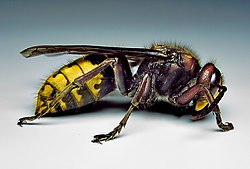This is an old revision of this page, as edited by 138.23.134.119 (talk) at 19:15, 7 December 2006 (some additions to text). The present address (URL) is a permanent link to this revision, which may differ significantly from the current revision.
Revision as of 19:15, 7 December 2006 by 138.23.134.119 (talk) (some additions to text)(diff) ← Previous revision | Latest revision (diff) | Newer revision → (diff)
| European Hornet | |
|---|---|

| |
| A female European hornet | |
| Scientific classification | |
| Kingdom: | Animalia |
| Phylum: | Arthropoda |
| Class: | Insecta |
| Order: | Hymenoptera |
| Family: | Vespidae |
| Genus: | Vespa |
| Species: | V. crabro |
| Binomial name | |
| Vespa crabro Linnaeus, 1761 | |
- For main article see hornet. For the insect known colloquially in America as a hornet see Bald-faced hornet, and similarly for the Australian hornet.
The European hornet Vespa crabro is the largest European eusocial wasp, commonly known simply as the "hornet". This is not to be confused with the colloquial use of hornet for the bald-faced hornet, or other yellowjackets in other countries. The queen measures 25 to 35 mm long, males and workers are smaller. In males, as in most members of the Aculeata, the antennae have 13 segments, while in females there are only 12; also as in other aculeates, the male abdomen has seven visible segments, while the female has six; females possess an ovipositor modified into a sting which is not barbed. See wasp and bee characteristics to help identify similar insects.
This species is not particularly aggressive except when defending the nest, and care must be taken when in proximity, as the stings are quite painful. As with most stinging insects, they will sting in self-defense when grabbed or stepped on.
Description
Eyes are deeply indented, shaped like a C. Wings are reddish-orange, the petiolated abdomen is orange striped with brown.
Geographic colour forms
European hornets worldwide are found with geographic colour forms :
- Vespa crabro crabro Linnaeus, 1758
- Vespa crabro vexator Harris, 1776
- Vespa crabro germana Christ, 1791
- Vespa crabro crabroniformis Smith, 1852
- Vespa crabro borealis Radoszkowski, 1863
- Vespa crabro oberthuri du Buysson, 1902
- Vespa crabro flavofasciata Cameron, 1903
- Vespa crabro altaica Pérez, 1910
- Vespa crabro caspica Pérez, 1910
- Vespa crabro chinensis Birula, 1925
Relationship with humans
- Also see hornet#Relationship with humans.
Stings
- Also see hornet#Stings.
Notes
- V. Dubatolov, J. Kojima, J. M. Carpenter, A. Lvovsky (2003). "Subspecies of Vespa crabro in two different papers by Birula in 1925". Entomological Science. 6 (2003): 215–216.
{{cite journal}}: CS1 maint: multiple names: authors list (link) - J.M. Carpenter, J. Kojima (1997). "Checklist of the species in the subfamily Vespinae (Insecta: Hymenoptera: Vespidae)". Natural History Bulletin of Ibaraki University. 1 (1997): 51–92.